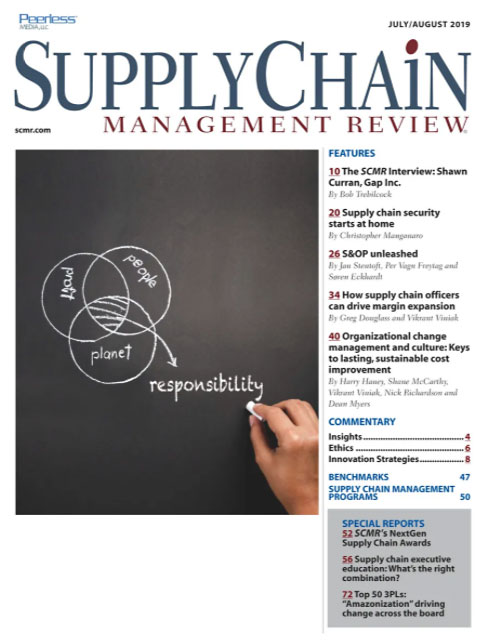Sorry, but your login has failed. Please recheck your login information and resubmit. If your subscription has expired, renew here.
July-August 2019
If you’re a long-time reader of Supply Chain Management Review, you’re familiar with Larry Lapide’s “Insights” column. Typically, Larry is writing about the many facets of planning, but occasionally, he takes on a provocative topic. One year, he questioned whether it was necessary to be a Top 25 supply chain leader, especially if in your industry, good enough gets the job done. Browse this issue archive.Need Help? Contact customer service 847-559-7581 More options
Several years ago at the Academic Reception at the annual Council of Supply Chain Management Professionals meeting I was talking with several of my peers from other institutions. We calculated that collectively the four of us had been in this field for about 160 years. One of my colleagues looked around the crowded room and said it was great to be a part of this burgeoning field, to which I observed that the field had taken one hell of a long time to burgeon. When I first entered the field it was called “transportation and physical distribution management.” It evolved into “transportation and logistics,” then “logistics” and now “supply chain management.”
During the past decade the number of university level supply chain management programs has expanded tremendously in recognition of the greater visibility of our discipline, its growing importance in global commerce and the robust market for students with a concentration in the field. That has brought some degree of euphoria with it, and as I reflect upon those developments it concerns me that the next generation of professors who will lead this field in the coming years doesn’t necessarily understand what it took to get the larger programs to this point.
There was a lot of blood, sweat and tears involved; the progress was very slow, and often very political. In many cases alliances with faculty members in other disciplines were required to support those development efforts because making room in curricula for supply chain management courses/concentrations often involved giving less emphasis to more traditional areas of business. That in turn often involved explaining to our academic colleagues, in very basic terms, what our field was and why it was important. It also entailed designing courses and programs from scratch, bargaining for meager university resources, selling the programs to students, administrators and employers and building a faculty base.

This complete article is available to subscribers only.
Log in now for full access or start your PLUS+ subscription for instant access.
SC
MR
Sorry, but your login has failed. Please recheck your login information and resubmit. If your subscription has expired, renew here.
July-August 2019
If you’re a long-time reader of Supply Chain Management Review, you’re familiar with Larry Lapide’s “Insights” column. Typically, Larry is writing about the many facets of planning, but occasionally, he… Browse this issue archive. Access your online digital edition. Download a PDF file of the July-August 2019 issue.Several years ago at the Academic Reception at the annual Council of Supply Chain Management Professionals meeting I was talking with several of my peers from other institutions. We calculated that collectively the four of us had been in this field for about 160 years. One of my colleagues looked around the crowded room and said it was great to be a part of this burgeoning field, to which I observed that the field had taken one hell of a long time to burgeon. When I first entered the field it was called “transportation and physical distribution management.” It evolved into “transportation and logistics,” then “logistics” and now “supply chain management.”
During the past decade the number of university level supply chain management programs has expanded tremendously in recognition of the greater visibility of our discipline, its growing importance in global commerce and the robust market for students with a concentration in the field. That has brought some degree of euphoria with it, and as I reflect upon those developments it concerns me that the next generation of professors who will lead this field in the coming years doesn't necessarily understand what it took to get the larger programs to this point.
There was a lot of blood, sweat and tears involved; the progress was very slow, and often very political. In many cases alliances with faculty members in other disciplines were required to support those development efforts because making room in curricula for supply chain management courses/concentrations often involved giving less emphasis to more traditional areas of business. That in turn often involved explaining to our academic colleagues, in very basic terms, what our field was and why it was important. It also entailed designing courses and programs from scratch, bargaining for meager university resources, selling the programs to students, administrators and employers and building a faculty base.
.
SC
MR


More Universities & Colleges
- Early bird pricing expires soon for NextGen Supply Chain Conference registration
- Squint named NextGen Supply Chain Conference Start-Up Award winner
- Keynotes from Procter & Gamble, Johnson & Johnson & Whirlpool execs highlight NextGen conference agenda
- Cybersecurity as a major supply chain risk domain
- Walmart named NextGen Supply Chain Visionary Award winner
- We asked LinkedIn readers to suggest supply chain books to read. Here’s what they said
- More Universities & Colleges
Latest Resources

 Explore
Explore
Education News
- Early bird pricing expires soon for NextGen Supply Chain Conference registration
- Squint named NextGen Supply Chain Conference Start-Up Award winner
- Keynotes from Procter & Gamble, Johnson & Johnson & Whirlpool execs highlight NextGen conference agenda
- Cybersecurity as a major supply chain risk domain
- Walmart named NextGen Supply Chain Visionary Award winner
- We asked LinkedIn readers to suggest supply chain books to read. Here’s what they said
- More Education
Latest Education Resources

Subscribe

Supply Chain Management Review delivers the best industry content.

Editors’ Picks





